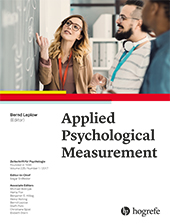Delusions: Risk-Factors, Models, and Approaches to Psychological Intervention
A Topical Issue of the Zeitschrift für Psychologie
Delusions are beliefs that are held with strong conviction despite evidence to the contrary. They develop on a background of genetic and environmental risk and tend to be accompanied by severe distress both for the individual who holds them and for others involved. Delusions typically occur in the context of mental disorders and are the most prominent symptom of psychosis.
Since the 1950s, when Aaron Beck published a description of how he treated a psychotic patient using a cognitive approach, research in this field has come a long way. We now know that different types of cognitive behavioral interventions are helpful in reducing delusional conviction and distress. Somewhat disappointingly, though, none of the existing interventions has consistently shown more than a small effect on delusions over and above medication effects. This challenges us to continue our search for the best psychological approaches to delusions. But how can we arrive at better interventions?
One step towards improved interventions is to come to a better understanding of the factors that contribute to the formation and maintenance of delusions. Numerous risk factors (e.g., social trauma and other social adversity) and correlates of delusions (e.g., low self-esteem, reasoning biases, and difficulties in emotion regulation) have been identified. Nevertheless, it is unclear how much each individual factor contributes to explaining delusions. Moreover, the interactions between different risk factors and their combined relevance to delusions are insufficiently understood. More research in this area is necessary in order to work out which factors should be given priority in therapy.
Another step towards better interventions is to refine explanatory models that can guide assessment and treatment. Existing models of delusions tend to focus on a selection of relevant factors and often fail to integrate all relevant levels of explanation (e.g., social, biological, cognitive, experiential, behavioral). More complex models that include a range of factors can help clarify which factors need to be addressed in treatment and may also improve prediction of which type of intervention could be helpful for whom and to what extent.
A third step lies in developing and evaluating novel interventions for delusions. Several researchers have proposed that it would be beneficial to focus interventions more explicitly on the factors identified as causal to delusion formation and maintenance. This can be done either by refining existing psychological interventions and tailoring them more specifically to the factors known to cause and maintain delusions or by developing novel types of interventions that target causal factors.
This topical issue of the Zeitschrift für Psychologie aims to bring together research that focuses on the challenge of improving psychological therapy for delusions via one of the three steps outlined above. I invite original or review papers that contribute to the understanding of how delusions arise and are maintained, theoretical models that integrate findings on delusions from different levels of explanation, and intervention research that investigates the effects of interventions derived from what is known about the factors that trigger, cause, and maintain delusions. Contributions may also involve studies that build on the continuum and investigate mechanisms or interventions in samples with subclinical levels of delusions, although studies involving clinical samples are preferred. In addition to full original or review articles and meta-analyses, shorter research notes and opinion papers are also welcome. Interested authors are invited to submit their abstracts on potential papers electronically to the guest editor, Tania Lincoln ([email protected]).
How to submit: Interested authors should submit a letter of intent including: (1) a working title for the manuscript, (2) names, affiliations, and contact information for all authors, and (3) an abstract of no more than 500 words detailing the content of the proposed manuscript.
There is a two-stage submissions process. Initially, interested authors are requested to submit only abstracts of their proposed papers. Authors of the selected abstracts will then be invited to submit full papers. All papers will undergo blind peer review.
- Deadline for submission of abstracts is July 15, 2017.
- Deadline for submission of full papers is November 15, 2017.
The journal seeks to maintain a short turnaround time, with the final version of accepted papers being due by February 15, 2018. The topical issue will be published as issue 3 (2018).
For additional information, please contact the guest editor.
About the Journal
The Zeitschrift für Psychologie, founded in 1890, is the oldest psychology journal in Europe and the second oldest in the world. One of the founding editors was Hermann Ebbinghaus. Since 2007 it is published in English and devoted to publishing topical issues that provide state-of-the-art reviews of current research in psychology.
For detailed author guidelines, please see the journal’s website at www.hogrefe.com/j/zfp



